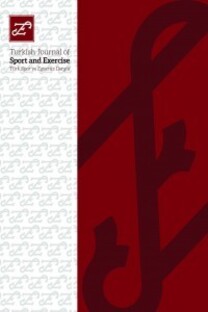Examination of Exercise Addiction Levels of University Students
Examination of Exercise Addiction Levels of University Students
___
- 1. Adams J. Kirkby RJ. Excessive Exercise as an Addiction: A Review. Addiction Research and Theory. 2002; 10: 415-437.
- 2. Adams JMM. Examining Exercise Dependence: The Development, Validation and Administration of the Exercise Behavior Survey with Runners, Walkers, Swimmers and Cyclists. Master Thesis, Kentucky. 2001.
- 3. Berczik K. Szabo A. Griffiths M. Kurimay T. Kun B. Urbán R. Demetrovics Z. ExerciseAddiction: Symptoms, Diagnosis, Epidemiology, and Etiology. Substance Use and Misuse. 2012; 47:403-417. Doi: 10.3109/10826084.2011.639120.
- 4. Bingöl E. Farklı branşlardaki sporcuların egzersiz bağımlılık ve psikolojik sağlamlık düzeylerinin incelenmesi. Yüksek Lisans Tezi. Muğla Sıtkı Koçman Üniversitesi. Sağlık Bilimleri Enstitüsü. Beden Eğitimi ve Spor Anabilimdalı. Muğla. 2015.
- 5. Bootan JS. Kickboks, Taekwondo ve MuayThai Sporcularının Egzersiz Bağımlılığının Araştırılması. Yüksek Lisans Tezi. Fırat Üniversitesi. Sağlık Bilimleri Enstitüsü. Beden Eğitimi ve Spor Anabilimdalı. Elazığ. 2018.
- 6. Cicioğlu Hİ. Tekkurşun Demir G. Bulğay C. Çetin E. Elit Düzeyde Sporcular ile Spor Bilimleri Fakültesi Öğrencilerinin Egzersiz Bağımlılığı Düzeyleri, Bağımlılık Dergisi. 2019; 20(1): 1-5.
- 7. Eysenck HJ. Addiction, Personality and Motivation. Human Psychopharmacology. 1997; 12(2): 79– 87.
- 8. Glasser W. Positive Addiction. Harper and Row Publisher. New York. 1976.
- 9. Hailey BJ. Bailey LA. Negative addiction in runners: A quantitative approach. Journal of Sport Behavior. 1982; 5: 150- 154.
- 10. Haskell WL. Kiernan M. Methodological issues in measuring physical activity and physical fitness when evaluating the role of dietary supplements for physically active people. American Journal of Clinical Nutrition. 2000; 72(2): 541-550.
- 11. Hausenblas HA. Downs DS. Exercise Dependence: A Systematic Review. Psychology Sport and Exercise. 2002; 3: 89-123.
- 12. Özer K. Fiziksel Uygunluk (4. Baskı). Nobel. Ankara. 20013.
- 13. Pierce EF. Rohaly KA. Fritchley B. Sex differences on exercise dependence for men and women in a marathon road race. Percept Motor Skills. 1997; 84: 991-994.
- 14. Sadıq BJ. Investigation of the exercise dependence of Athlets' KickBoxing, Taekwondo and MuayThai. Fırat University. Institute of Health Sciences Department of Physıcal Educationand Sports. Master Thesis. 2018.
- 15. Shao AT. Marketing Research: An Aid to Decision Making, Cincinnati, Ohio: South-Western/Thomson Learning. 2002.
- 16. Szabo A. Griffiths M. Exercise Addiction in British Sport Science Students. Int J Ment Health Addiction. 2007; 5:25–28. Doi 10.1007/S11469-006-9050-8.
- 17. Taylor AH. Physical activity, anxiety and stress. In: Physical activity and psychological well-being. SJH Biddle, KR Fox, HBoutcher (Eds), London, Routledge. 2000.
- 18. Tekkurşun Demir G. Türkeli A. Spor Bilimleri Fakültesi Öğrencilerinin Egzersiz Bağımlılığı ve Zihinsel Dayanıklılık Düzeylerinin İncelenmesi. Spor Bilimleri Araştırmaları Dergisi. 2019; 4(1):10-24. DOI: 10.25307/jssr.505941
- 19. Tekkurşun-Demir G. Hazar Z. Cicioğlu Hİ. Egzersiz Bağımlılığı Ölçeği (EBÖ): Geçerlik ve Güvenirlik Çalışması. Kastamonu Eğitim Dergisi. 2018; 26(3): 865-874.
- 20. Vardar E. Exercise Dependence. Trakya Üniversitesi Tıp Fakültesi Psikiyatri Anabilim Dalı, Edirne Arşiv Kaynak Tarama Dergisi (ArchivesMedicalReviewJournal). 2012; 21(3): 163-173.
- 21. Wilmore JH. Costill DL. Physiology of Sportand Exercise. Champaign, IL: Human Kinetics. 1994.
- 22. Yeltepe H. Egzersiz Bağımlılığının Tanımlanması ve “Egzersiz Bağımlılığı Ölçeği-21” in Geçerlilik ve Güvenilirlik Çalışmasının Yapılması. Yayımlanmış Yüksek Lisans Tezi. Marmara Üniversitesi. Sağlık Bilimleri Enstitüsü. 2005.
- 23. Yeltepe-Ercan H. Bağımlılık Tedavisinde Egzersiz Tedavisi. Nobel. Ankara. 2013.
- 24. Yıldırım İ. Yıldırım Y. Ersöz Y. Işık Ö. Saraçlı S. Karagöz Ş. Yağmur R. Egzersiz bağımlılığı, yeme tutum ve davranışları ilişkisi. CBÜ Beden Eğitimi ve Spor Bilimleri Dergisi. 2017; 12(1): 43-54.
- 25. Zmijewski CF. Howard MO. Exercise Dependence and Attitudes Toward Eating Among Young Adults. Eating Behaviors. 2000; 4: 181-195.
- Yayın Aralığı: 3
- Başlangıç: 1999
- Yayıncı: Selçuk Üniversitesi, Spor Bilimleri Fakültesi
Monitoring Hydration Status of Elite Judo Athletes During a Competition Day
Veli Volkan GÜRSES, Bilgehan BAYDİL, Bayram CEYLAN, Mustafa Şakir AKGÜL, Latif AYDOS
Can Mindful Eating Help Us When We Struggle With Eating? Mindful Eating Replaces Diets
Hüseyin ASLAN, Yener AKSOY, Osman İMAMOĞLU
The Effect Of Sports On The Attention Levels Of Primary School Students
Osman İmamoğlu, Yener Aksoy, Hüseyin Aslan
Wondiye AYCHİLUHİM, Molla DEYOU
Erdal TAŞGIN, Şenay LEYLA, Muhammet BASTEM, Ali Salah ZAYNL ABDEIN, Metin ÖZLÜ, Fatih YILMAZ, Özlem BAĞIŞ, Ela ATAY
